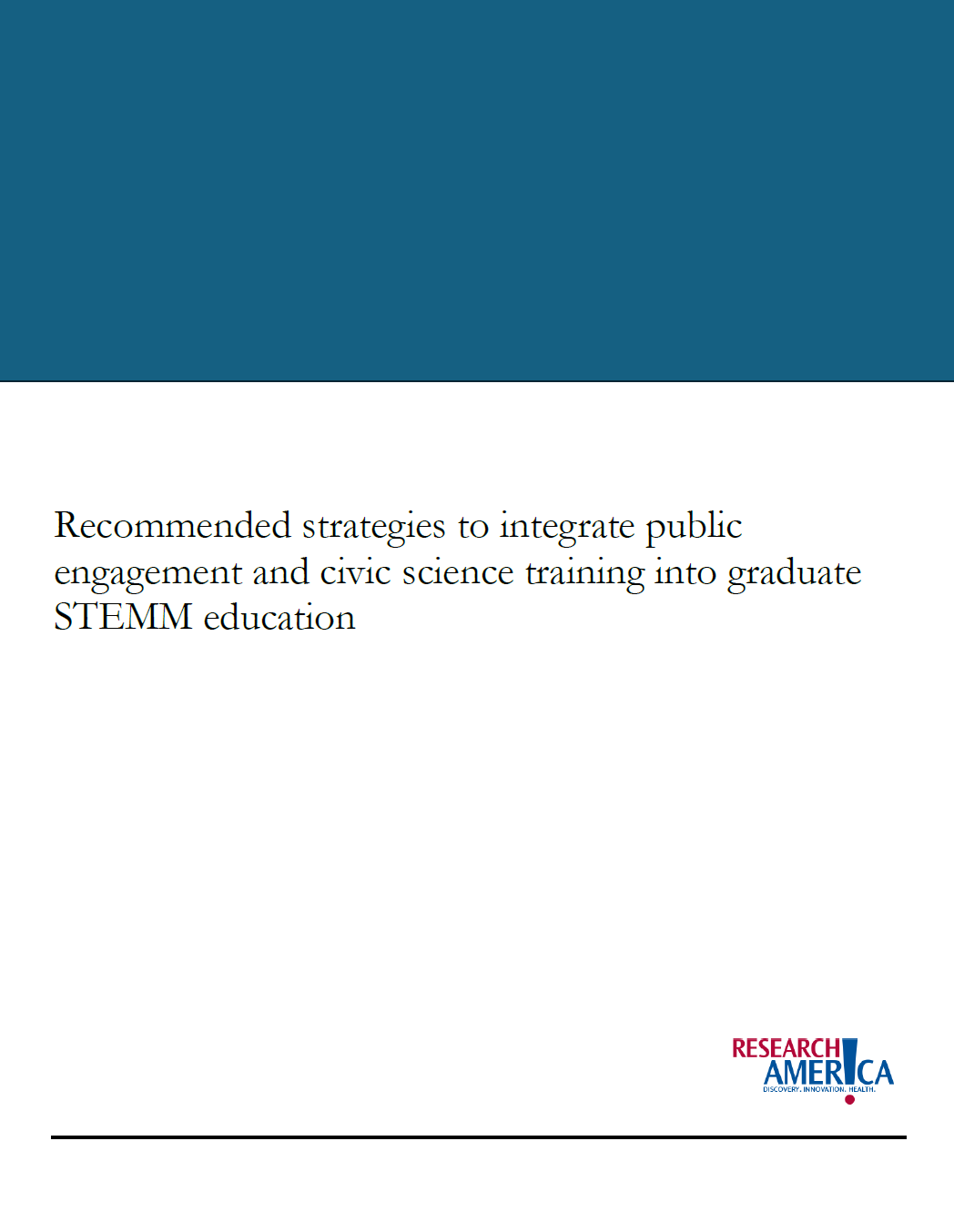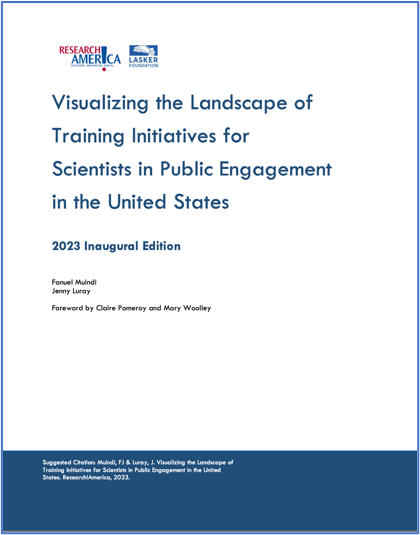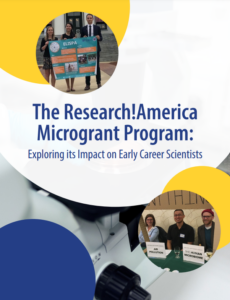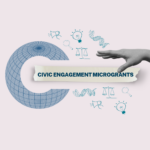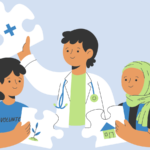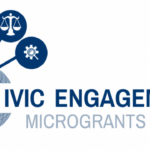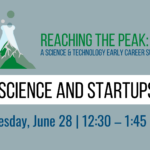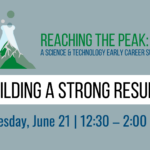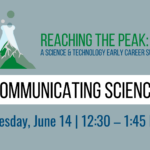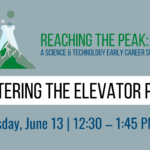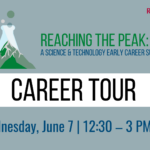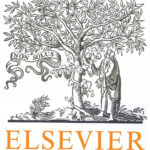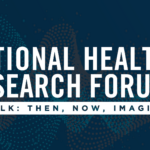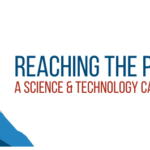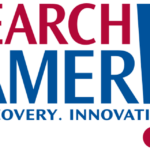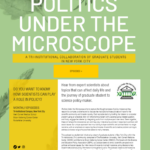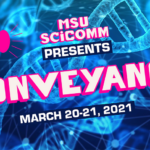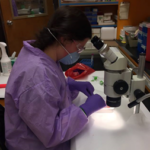Civic Science
Research!America seeks to empower early-career researchers to learn how to engage their communities in two-way dialogue about timely science and research issues.
The Civic Engagement Microgrant Program
A core component of our civic science work is the Civic Engagement Microgrant Program, supported by the Howard Hughes Medical Institute. The Microgrant program provides funding for STEM graduate students, professional students (medical, dental, nursing, pharmacy, etc.), and postdocs who want to create projects that build policy, communications, and program management skills and are aimed at building dialogue with public officials, community leaders, and community members around issues of common interest. Learn more about the Research!America Civic Engagement Microgrant Program for student and postdoc-led science policy groups and read about previous years’ projects.
For 30 years, Research!America has been committed to advocacy for science, discovery, and innovation to achieve better health for all. The Civic Science Microgrant program is supported by a grant from the Howard Hughes Medical Institute. Support for curricula development through microgrants is provided by the Lasker Foundation. Additional support received from the Chalk Talk Science Project. Special funding received from the Alfred P. Sloan Foundation for work related to building equity in the Research!America Microgrant Program.
Public Engagement Training Content Microgrants
Applications for the 2024-2024 cohort are closed!
With support from the Lasker Foundation, Research!America is launching a new category of microgrants for 2024-2025. Stipends of $5,000 each will fund new open access curriculum development in science communication and other public engagement skills.
The content developed through these microgrants may include, but is not limited to, material that enables scientists to communicate more effectively with non-scientists, both in-person and online using bidirectional methods, the use of social media to reach non-scientists, and approaches to addressing mis/disinformation through a variety of formats. Training components may also include the roles and expectations of key stakeholder groups that impact the scientific enterprise including patient groups, industry, government agencies and policymakers, community groups, and the media.
For 30 years, Research!America has been committed to advocacy for science, discovery, and innovation to achieve better health for all. Support for curricula development through microgrants is provided by the Lasker Foundation.
Advocacy 101 for Early Career Researchers
Advocacy is an opportunity to educate elected officials on why they should care about science and research. Your experience as a researcher is incredibly meaningful and Congressional representatives value your perspectives on the work being done in the state or district they represent. However, when working as a researcher there are some important considerations and preparations to make before engaging directly with your Representatives.
Learn more about the Do’s and Don’ts of Advocacy for Researchers
Recommended Strategies to Integrate Public Engagement and Civic Science Training Into Graduate STEMM Education
Research!America convened the Public Engagement Working Group to advise Research!America on strategic action steps needed to integrate public engagement and civic science training into graduate science, technology, engineering, mathematics and medicine (STEMM) education. Led by co-chairs Alan Leshner, CEO Emeritus of AAAS, and Keith Yamamoto, Professor Emeritus and Vice Chancellor for Science Policy and Strategy at UCSF, the group engaged 26 members from academia and philanthropy. The group met between December 2023 and May 2024 for presentations and discussions to assist Research!America in developing recommendations for academic institutions, federal funders, and foundations.
Those concrete steps, described in the strategic document, will help ensure that all STEMM trainees have access to public engagement training. Research!America thanks the Rita Allen Foundation for its generous support and the working group for their valuable insights and input.
Visualizing the Landscape of Training Initiatives for Scientists in Public Engagement in the United States
In partnership with the Albert and Mary Lasker Foundation, Research!America conducted an in-depth mapping of the public engagement training landscape in the United States. This inaugural report offers a detailed overview of the diversity and scope of training initiatives enhancing public engagement for scientists. Notably, the report includes an interactive dashboard that provides a dynamic window into the rapidly developing field of training in public engagement. Together, the report and dashboard are designed to inspire new discussions, connections, and collaborations that further strengthen the ecosystem of public engagement training for scientists.
The Research!America Microgrant Program: Exploring its Impact on Early Career Scientists
Connecting scientists to citizens and citizens to scientists to foster understanding and further shared goals has been central to Research!America’s mission since it was founded in 1989 and it continues to be a vital focus for the organization today. A core component of our civic science work is the Civic Engagement Microgrant Program, supported by the Rita Allen Foundation. Since 2018, our Microgrant program has worked directly with groups of STEM graduate students and postdoctoral researchers (post-docs) from across the country to provide small grants to support civic engagement projects. At this juncture, having supported 65 microgrants over the past four years, it is beneficial to take a deep dive into the initiative. Contact us at, [email protected], with questions or comments about the report.
Early Career Scientist Spotlights
To learn more about the work the early-career scientists are doing, check out these spotlights:
STEM Poster Day Brings Science Under the Gold Dome of the Colorado Capitol
PhD Graduate Follows Her Dream, One Step at a Time
Neuroscience Saved My Life and Gave Me a Vocation
Microgrant Spotlight: The Activist Lab at the University of South Florida College of Public Health
Making the Case for Research on Zoom: Report from a Successful Virtual Hill Day





